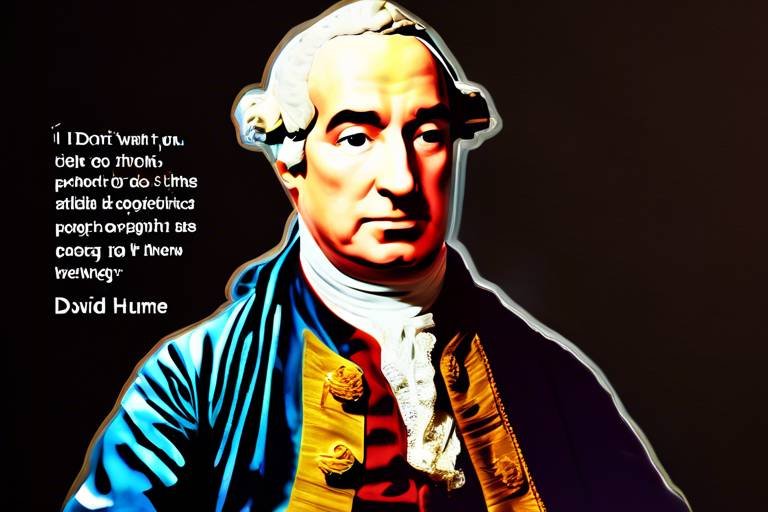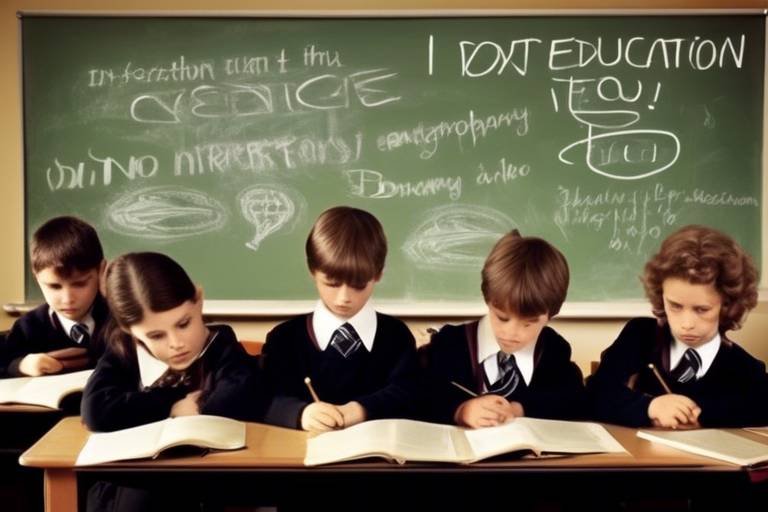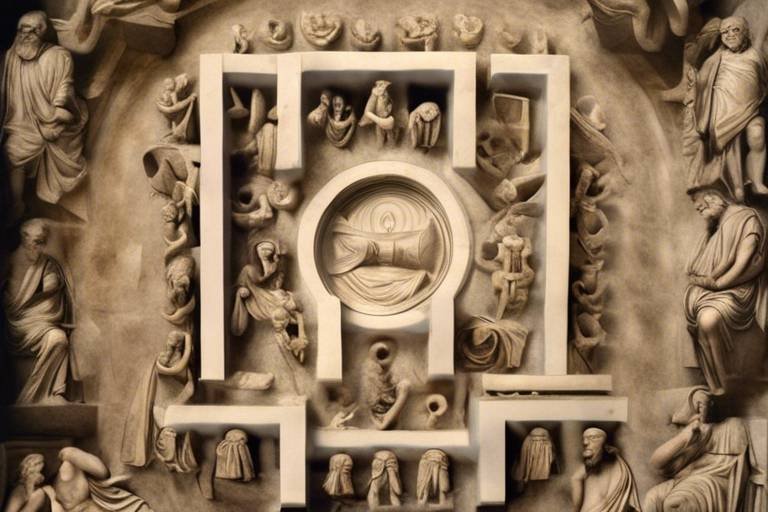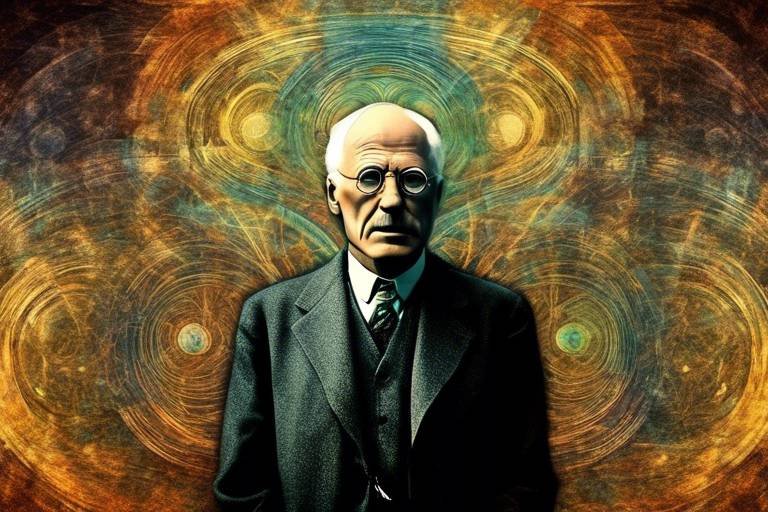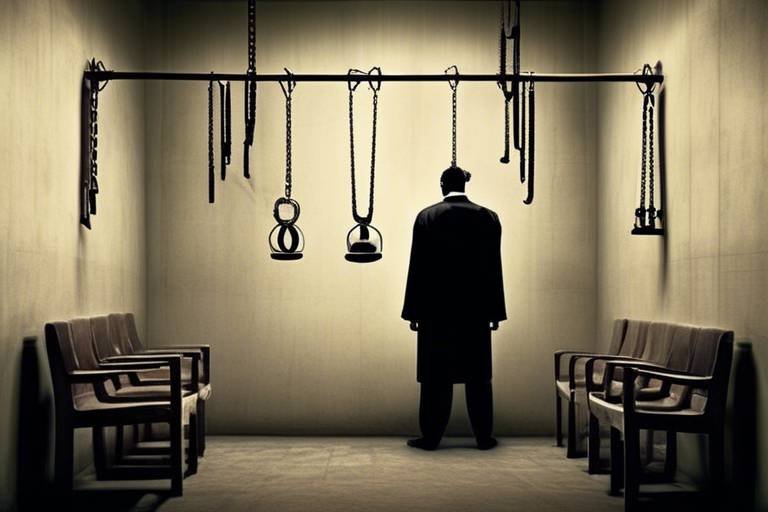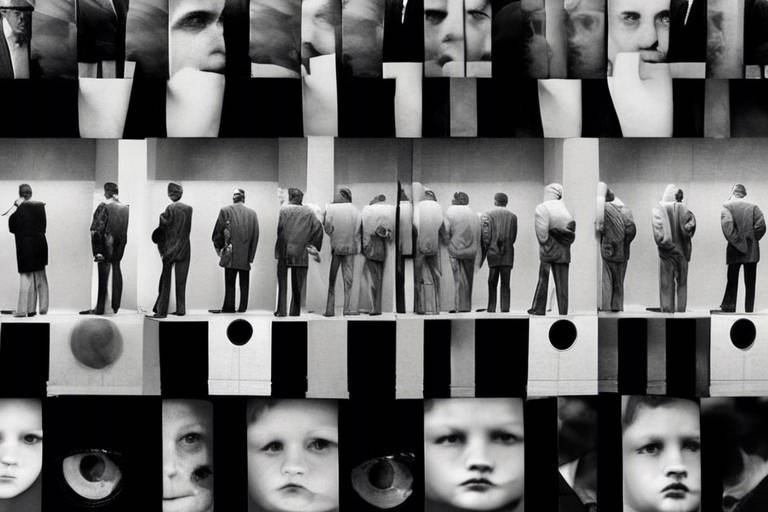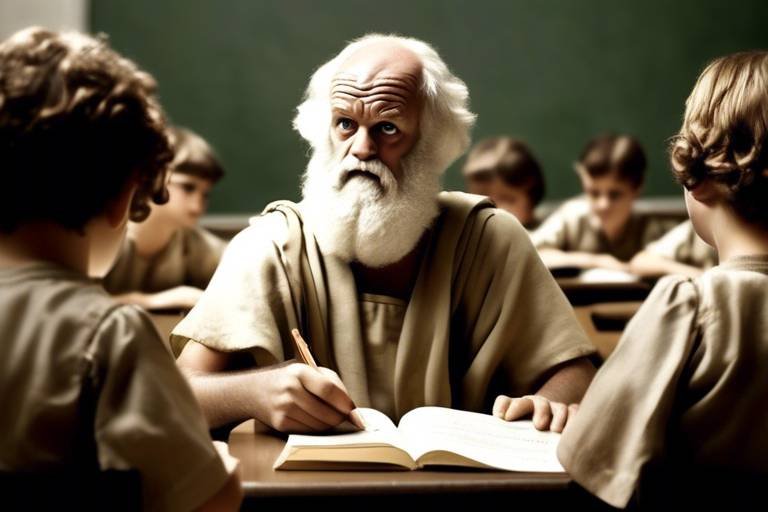Analyzing the Philosophy of Determinism
Determinism is a captivating philosophical doctrine that has intrigued thinkers for centuries. At its core, it suggests that every event, including human actions, is determined by preceding events and conditions, leading to the idea that everything in the universe is interconnected through a web of causality. Imagine a vast, intricate machine where every gear and cog influences the others, creating a harmonious yet predetermined outcome. This perspective raises profound questions about the nature of reality, free will, and moral responsibility. Are we merely players in a grand script, or do we possess the ability to write our own narratives?
As we embark on this exploration of determinism, we will delve into its historical context, key concepts, and the various types that have emerged over time. We will also tackle the critiques that challenge its implications, particularly concerning free will and ethics. By examining these facets, we aim to uncover the deeper meanings behind determinism and its relevance in contemporary philosophical discourse.
Throughout history, determinism has been a recurring theme in philosophical thought, influencing figures from ancient philosophers like Aristotle to modern thinkers. Its evolution reflects humanity's quest to understand the universe and our place within it. By tracing the roots of determinism, we can better appreciate its impact on various schools of thought and how it continues to shape our understanding of human behavior.
In the upcoming sections, we will dissect the fundamental concepts associated with determinism, such as causality and predictability, which serve as the bedrock for this philosophical framework. We will also categorize determinism into its different types, including causal, logical, and theological determinism, each offering unique insights into the nature of existence and human agency.
As we navigate through the intricate web of determinism, we will also confront the critiques that challenge its validity. Many philosophers argue that determinism undermines the notion of free will, raising essential questions about moral responsibility and accountability. By engaging with these critiques, we can better understand the ongoing debate surrounding determinism and its implications for our understanding of ethics and human behavior.
Ultimately, this article aims to provide a comprehensive analysis of determinism, inviting readers to ponder their own beliefs about free will and the extent to which our lives are predetermined. So, buckle up as we embark on this philosophical journey, exploring the depths of determinism and its far-reaching implications!
- What is determinism? Determinism is the philosophical belief that every event or action is determined by preceding events in accordance with the natural laws.
- How does determinism relate to free will? The relationship between determinism and free will is complex; some argue they can coexist (compatibilism), while others believe they are mutually exclusive (incompatibilism).
- What are the implications of determinism on ethics? Determinism challenges traditional views of moral responsibility, suggesting that if our actions are predetermined, our accountability may be called into question.
- Can determinism be proven? The debate over determinism is ongoing, with various philosophical arguments both supporting and challenging its validity.

Historical Context of Determinism
To truly grasp the essence of determinism, we must embark on a journey through its historical roots. This philosophical doctrine, which posits that every event is the result of preceding events and conditions, has been a cornerstone of intellectual thought for centuries. Its origins can be traced back to ancient civilizations, where the interplay of fate, free will, and divine intervention sparked debates that continue to resonate today.
In ancient Greece, philosophers like Heraclitus and Democritus laid the groundwork for deterministic thought. Heraclitus famously stated that everything is in flux, yet he also suggested that there is an underlying order to the chaos, hinting at a deterministic framework. On the other hand, Democritus introduced the concept of atoms and the idea that everything in the universe is governed by natural laws, a notion that aligns closely with modern scientific determinism.
The Middle Ages brought a new dimension to determinism, particularly through the lens of theological perspectives. Thinkers like St. Augustine and Thomas Aquinas grappled with the relationship between divine omniscience and human free will. They posed challenging questions: If God knows everything that will happen, does that mean our choices are predetermined? This theological determinism stirred significant discourse, shaping the way people viewed morality and responsibility.
As we transitioned into the Enlightenment period, the deterministic narrative evolved further. The rise of scientific inquiry during this era, spearheaded by figures such as Isaac Newton, solidified the belief that the universe operates according to fixed laws. Newton's laws of motion and universal gravitation provided a framework that suggested predictability in physical phenomena, reinforcing the deterministic viewpoint. Philosophers like Baruch Spinoza also contributed to this discourse, arguing that everything in the universe is interconnected and follows a rational order.
Fast forward to the 19th and 20th centuries, where the emergence of deterministic theories in psychology and sociology further complicated the conversation. The works of Sigmund Freud introduced the idea that our behaviors and choices are influenced by unconscious drives, suggesting that even our seemingly free decisions are determined by prior experiences. Similarly, sociologists like Émile Durkheim argued that social structures and cultural norms shape individual behavior, reinforcing the deterministic view in a social context.
Today, the debate surrounding determinism continues to thrive, fueled by advancements in neuroscience and quantum physics. As we delve deeper into the workings of the human brain, questions arise about the extent to which our thoughts and actions are predetermined by biological processes. The implications of these findings challenge our understanding of free will and have sparked renewed interest in the philosophical implications of determinism.
In summary, the historical context of determinism reveals a rich tapestry of thought that spans across cultures and eras. From ancient philosophers to modern scientists, the quest to understand the nature of reality and our place within it remains an enduring pursuit. As we navigate through these complex ideas, we must ask ourselves: How do our beliefs about determinism influence our understanding of choice, responsibility, and morality?
- What is determinism? Determinism is the philosophical belief that all events, including human actions, are determined by preceding events in accordance with the natural laws.
- Who were the key philosophers in the development of determinism? Key figures include Heraclitus, Democritus, St. Augustine, Thomas Aquinas, Isaac Newton, and Sigmund Freud.
- How does determinism relate to free will? The relationship is complex; determinism suggests that choices are influenced by prior events, while free will advocates argue for autonomy in decision-making.
- What are the implications of determinism on ethics? Determinism raises questions about moral responsibility, as it challenges the notion that individuals have complete control over their actions.

Key Concepts in Determinism
Determining the essence of determinism requires a deep dive into several key concepts that form its backbone. At the heart of this philosophical doctrine lies the notion of causality, which posits that every event is the result of preceding events and conditions. Imagine a row of dominoes; when one falls, it inevitably causes the next to tumble. This chain reaction is the essence of causal relationships that determinism hinges upon. Understanding causality helps us grasp how determinism claims that our choices and actions are not random but rather the end results of a long chain of prior occurrences.
Another crucial concept is predictability. In a deterministic framework, if we had complete knowledge of all initial conditions and laws governing the universe, we could theoretically predict every event that follows. This concept often leads to fascinating discussions about the limits of human knowledge and the role of chance in our lives. For instance, while we might think we’re making spontaneous choices, determinists argue that these decisions are merely the outcomes of prior influences, whether they be genetic, environmental, or social.
The nature of reality itself also plays a pivotal role in understanding determinism. Reality, as viewed through a deterministic lens, suggests that everything is interconnected, and nothing occurs in isolation. This interconnectedness implies that our personal experiences, beliefs, and decisions are influenced by a myriad of factors that we may not even be aware of. The philosophical implications of this interconnected reality challenge our understanding of autonomy and self-determination.
To summarize, the key concepts in determinism can be encapsulated in the following points:
- Causality: Every event is the result of preceding events.
- Predictability: Complete knowledge of conditions allows for the prediction of future events.
- Interconnectedness: Reality suggests that all events and choices are influenced by a multitude of factors.
These concepts not only help frame the philosophical discussions surrounding determinism but also prompt us to question our own beliefs about free will and moral responsibility. As we explore further into the types of determinism, we will see how these foundational ideas manifest in various philosophical arguments and debates.

Types of Determinism
Determinism isn't just one single idea; it's a rich tapestry of various perspectives that all seek to explain how events unfold in our universe. To truly grasp the implications of determinism, we need to explore its different types, each offering unique insights into how we understand causality, choice, and fate. These types include causal determinism, logical determinism, and theological determinism. Let's dive into each of these categories to see how they shape our understanding of the world around us.
Causal determinism is perhaps the most widely recognized form. It posits that every event or state of affairs, including human actions, is the result of preceding events in accordance with the natural laws. Imagine a row of dominoes; when one falls, it inevitably causes the next one to fall. In this view, our choices are like those dominoes, falling in a predetermined sequence based on prior states. This raises an intriguing question: if every action is a consequence of prior events, can we truly claim to be the authors of our decisions?
On the other hand, we have logical determinism, which suggests that propositions about the future are already true or false. This perspective raises the question of whether the future is fixed in a way that mirrors a mathematical equation. If we accept this viewpoint, it suggests that our future actions are already set in stone, leading to a rather unsettling conclusion about the nature of our choices. Think of it like a script for a play; if the script is written, the actors can only follow their lines, regardless of their personal desires or intentions.
Lastly, we encounter theological determinism, which introduces a divine element into the mix. This view holds that a divine being has preordained all events, including human actions. It prompts a fascinating discussion about the intersection of faith, free will, and moral responsibility. If everything is predestined by a higher power, what does that mean for our ability to choose? Are we merely following a divine script, or is there room for personal agency within that framework? This type of determinism often sparks heated debates among theologians and philosophers alike.
In summary, the types of determinism offer a rich field for exploration and debate. Each type presents its own set of implications for how we understand human behavior, morality, and the very fabric of reality. Whether we view ourselves as dominoes in a chain of causation, actors following a script, or as participants in a divine plan, the questions raised by these perspectives are profound and deserve careful consideration.
- What is the main difference between causal and theological determinism?
Causal determinism focuses on natural laws and prior events that lead to outcomes, while theological determinism involves a divine being preordaining events. - Can determinism coexist with free will?
This is a central debate in philosophy, with compatibilists arguing that free will can exist within a deterministic framework, while incompatibilists believe they cannot coexist. - How does determinism affect moral responsibility?
Determinism raises questions about accountability, as it challenges the idea that individuals are solely responsible for their actions if those actions are predetermined.

Causal Determinism
Causal determinism is a fascinating concept that suggests every event is the result of preceding events and conditions. Imagine a row of dominoes; when one falls, it inevitably causes the next to tumble. This analogy perfectly encapsulates the essence of causal determinism, where every action, choice, and occurrence is linked in a chain of cause and effect. This perspective leads us to ponder: if our choices are merely the outcomes of prior states, do we truly possess free will?
To delve deeper, let’s consider the implications of causal determinism in our daily lives. If we accept that our decisions are predetermined by past events, we might start to view ourselves as mere participants in a grand play, following a script written by the universe. This realization can be both liberating and daunting. On one hand, it alleviates the pressure of decision-making, as we might think, “What will be, will be.” On the other hand, it raises profound questions about accountability and moral responsibility. If our actions are dictated by a series of prior causes, can we be held responsible for our choices?
Furthermore, causal determinism is often illustrated through scientific principles. The laws of physics, for instance, operate under deterministic rules. In a controlled environment, knowing the initial conditions allows us to predict future states with remarkable accuracy. This predictability extends to various fields, such as psychology and sociology, where behaviors can be traced back to earlier experiences or biological factors. It’s as if we are all part of an intricate web of causality, where understanding one thread can lead to insights about the whole tapestry of existence.
However, the concept of causal determinism is not without its critics. Some argue that it undermines the notion of personal agency. For instance, if someone commits a crime, can we truly say they had a choice if their actions were the result of a long chain of events? This dilemma is at the heart of many philosophical debates surrounding free will and moral responsibility. As we navigate these discussions, it becomes essential to consider the broader implications of our beliefs about causality.
In summary, causal determinism compels us to reflect on the nature of our existence and the extent of our autonomy. It challenges us to reconcile the deterministic view of the universe with our intuitive sense of free will. As we explore these philosophical waters, we must ask ourselves: are we the architects of our destiny, or are we simply following a predetermined path laid out by the forces of nature?
- What is causal determinism? Causal determinism is the philosophical idea that every event or action is the result of preceding events and conditions.
- Does causal determinism eliminate free will? This is a contentious issue. While some argue it undermines free will, others believe that free will can coexist within a deterministic framework.
- How does causal determinism relate to science? Many scientific laws operate under deterministic principles, allowing for predictions based on initial conditions.
- What are the implications of accepting causal determinism? Accepting causal determinism can change how we view moral responsibility and accountability for our actions.

Theological Determinism
Theological determinism is a fascinating and often contentious branch of determinism that posits that a divine being, such as God, has preordained every event that occurs in the universe. This view suggests that everything from the rise and fall of empires to the mundane choices of everyday life has been divinely scripted. At first glance, this might seem comforting—after all, if everything is part of a grand design, what room is left for chaos? However, this belief raises profound questions about the nature of free will and moral responsibility.
To understand theological determinism, we must first consider its implications. If a divine being has already determined the course of our lives, can we truly claim to have any autonomy over our choices? This leads to a paradox: if our actions are preordained, how can we be held accountable for them? Imagine a play where every actor's lines are scripted by a playwright. The actors may perform their roles with passion, but ultimately, they are bound by the script. In this analogy, humans are akin to those actors, performing their parts in a divine narrative.
Supporters of theological determinism often cite various religious texts to bolster their arguments. For instance, in many interpretations of Christianity, verses from the Bible suggest that God has a plan for each individual. Similarly, in Islam, there is a strong emphasis on the concept of Qadar, or divine predestination, which asserts that Allah has knowledge of all that will happen and has decreed it accordingly. However, these interpretations can vary significantly among different theological traditions, leading to a rich tapestry of beliefs surrounding this concept.
Critics of theological determinism argue that it undermines the essence of human experience. If we are merely puppets in a divine play, then the emotions we feel—joy, sorrow, love, and anger—may seem trivial. They argue that this perspective diminishes the significance of personal struggle and growth. After all, how meaningful is an achievement if it was never truly within our control? This tension between divine sovereignty and human agency is a central theme in many philosophical discussions.
Moreover, the implications of theological determinism extend beyond philosophy into the realm of ethics. If all actions are preordained, what does that mean for concepts like justice and punishment? Should individuals be punished for actions that were never truly their choice? This question becomes even more complex when considering societal structures that rely on accountability and moral judgment.
In conclusion, theological determinism presents a compelling yet challenging view of existence. It invites us to ponder the intricate relationship between divine will and human freedom. As we navigate these philosophical waters, we are left to wonder: can we reconcile our understanding of a benevolent God with the belief that our lives are predestined? This exploration not only shapes our understanding of theology but also influences our perceptions of morality and personal responsibility.
- What is theological determinism?
Theological determinism is the belief that a divine being has preordained all events in the universe, including human actions.
- How does theological determinism affect free will?
This belief raises questions about human autonomy, suggesting that if actions are predetermined, individuals may lack true free will.
- What are the implications for moral responsibility?
It challenges the notion of accountability, as individuals may not be fully responsible for actions that were predetermined.
- Are there different interpretations of theological determinism?
Yes, interpretations vary among different religious traditions, leading to diverse beliefs about divine predestination.

Critiques of Determinism
Determinism, while a compelling philosophical doctrine, has faced significant criticism from various corners of the intellectual world. Critics argue that the implications of determinism threaten the very foundation of human agency and moral responsibility. One of the primary critiques centers around the concept of free will. If our choices are merely the result of prior events and conditions, can we truly claim to be the authors of our actions? This question leads to a deeper exploration of autonomy and the essence of human experience.
Moreover, some philosophers contend that determinism undermines the notion of accountability. If every action is predetermined, then individuals may not be held morally responsible for their deeds. This perspective raises unsettling questions: Should we punish a person for a crime if their actions were merely the result of a series of causal events beyond their control? Critics argue that such a view could lead to a society where moral judgment loses its significance, as individuals might deflect blame onto external factors.
In addition to these moral implications, there are also epistemological critiques. Some skeptics question whether determinism can adequately account for the unpredictability observed in complex systems, such as human behavior and social interactions. For instance, the field of psychology often highlights the role of spontaneity and creativity in human decision-making, suggesting that not all actions can be traced back to preceding events in a linear fashion. This unpredictability challenges the deterministic framework, prompting questions about its applicability to real-world scenarios.
Another significant critique comes from the realm of quantum mechanics, where the behavior of particles at a subatomic level appears to be inherently probabilistic rather than deterministic. This unpredictability at the quantum level introduces an element of randomness that seems to contradict the deterministic worldview. As physicist Niels Bohr famously stated, “Everything we call real is made of things that cannot be regarded as real.” This statement suggests that at the most fundamental level, the universe may not adhere to deterministic principles.
To summarize, the critiques of determinism can be categorized into several key areas:
- Free Will: The challenge of reconciling determinism with the concept of personal agency and authorship of actions.
- Moral Responsibility: Concerns about accountability and the implications for justice and societal norms.
- Epistemological Concerns: The unpredictability of human behavior and its resistance to deterministic explanations.
- Quantum Mechanics: Evidence from physics that suggests a non-deterministic nature of reality.
These critiques highlight the ongoing debate surrounding determinism and its implications. As we continue to explore the nature of reality, human behavior, and moral responsibility, it becomes evident that the conversation is far from settled. Philosophers, scientists, and ethicists alike grapple with these questions, seeking to understand the balance between determinism and the complexities of human experience.
- What is determinism? Determinism is the philosophical doctrine that all events, including human actions, are determined by preceding events in accordance with the natural laws.
- How does determinism affect free will? Determinism raises questions about free will by suggesting that our choices may be predetermined by prior events, challenging the idea of personal agency.
- What are the main critiques of determinism? Critics argue against determinism on grounds of moral responsibility, the unpredictability of human behavior, and the implications of quantum mechanics.
- Can determinism coexist with moral responsibility? This is a contentious issue; some philosophers argue for compatibilism, while others maintain that determinism negates moral accountability.

Determinism and Free Will
The relationship between determinism and free will is one of the most contentious debates in philosophy. At its core, this discussion revolves around whether our choices are truly our own or if they are simply the outcomes of a long chain of preceding events. Imagine standing at a crossroads, where every path you could take has already been predetermined by a series of events leading up to that moment. Is the decision you make genuinely yours, or are you merely following a script written by the universe? This question strikes at the heart of human experience and challenges our understanding of autonomy and personal responsibility.
Determinism asserts that every event, including human actions, is the result of preceding causes. This leads to a rather unsettling conclusion: if everything is predetermined, can we really claim to have free will? On the flip side, proponents of free will argue that individuals possess the ability to make choices independent of external influences. This clash of ideas creates a philosophical tug-of-war that has persisted for centuries.
To further illustrate the complexity of this debate, let’s explore two primary perspectives: compatibilism and incompatibilism. Compatibilists believe that free will and determinism can coexist harmoniously. They argue that even if our choices are influenced by prior events, we can still act freely as long as we are not coerced. In this view, freedom is defined more by the absence of external constraints than by the absence of causation. For instance, if you choose to go for a walk because you enjoy it, that choice can still be considered free, even if it was influenced by your upbringing and past experiences.
On the other hand, incompatibilists hold a different stance. They argue that if determinism is true, then free will cannot exist at all. This perspective posits that true freedom requires the ability to have acted differently in a given situation. If every choice is predetermined, then the very notion of personal responsibility becomes questionable. For incompatibilists, the implications are profound: if we do not have free will, how can we hold individuals accountable for their actions? This line of reasoning leads to a reevaluation of our justice system, moral judgments, and societal norms.
As we dive deeper into this philosophical conundrum, it becomes clear that the implications of determinism extend beyond academic debates. They challenge our everyday understanding of ethics and morality. If our actions are predetermined, can we truly be praised for good deeds or blamed for bad ones? This dilemma raises critical questions about how we perceive human behavior and the very fabric of our societal structures.
To summarize, the interplay between determinism and free will is a complex tapestry woven with threads of history, philosophy, and human experience. While compatibilism offers a way to reconcile these seemingly opposing views, incompatibilism presents a more radical challenge to our understanding of autonomy. As we continue to explore these ideas, we must consider how they shape not only our philosophical outlook but also our everyday lives.
- What is determinism? Determinism is the philosophical doctrine that every event or state of affairs, including human actions, is determined by preceding events in accordance with the natural laws.
- Can free will exist in a deterministic universe? Compatibilists argue that free will can exist even if determinism is true, while incompatibilists believe that true free will cannot exist if determinism is correct.
- How does determinism affect moral responsibility? If determinism is true, it raises questions about whether individuals can be held morally responsible for their actions, as those actions may be predetermined.

Compatibilism
Compatibilism is a fascinating philosophical stance that seeks to harmonize two seemingly opposing concepts: determinism and free will. At first glance, it might appear that if every action and event is predetermined by prior causes, then genuine freedom cannot exist. However, compatibilists argue that this is a misunderstanding of what free will truly means. They contend that even in a deterministic universe, individuals can still possess the capacity to make choices that are aligned with their desires, intentions, and motivations.
To illustrate this, consider the analogy of a river. A river flows in a specific direction due to the landscape it traverses. While the path of the river is determined by its surroundings, the water within it can still move freely and make small eddies and currents. In the same way, compatibilists believe that human beings, while influenced by their past experiences and environmental factors, can still exercise their will within the constraints of those influences.
One of the key arguments for compatibilism is that it redefines free will not as the absolute ability to choose differently in identical situations, but rather as the ability to act according to one's motivations without external coercion. This perspective allows for a more nuanced understanding of moral responsibility. If someone makes a decision based on their own desires, even if those desires are shaped by prior events, they can still be held accountable for their actions.
Critics of compatibilism often point out that this view may dilute the concept of free will, suggesting that it reduces our autonomy to mere reactions to external stimuli. However, compatibilists argue that acknowledging the deterministic aspects of our existence does not negate our ability to reflect, deliberate, and choose. In fact, this understanding can lead to a deeper appreciation of the complexities of human behavior.
Ultimately, compatibilism presents a middle ground in the debate over free will and determinism. It invites us to reconsider our assumptions and encourages a more profound exploration of what it means to be human in a world governed by cause and effect. By recognizing that our choices are influenced but not entirely dictated by our circumstances, compatibilism provides a framework that respects both our capacity for decision-making and the realities of the world we inhabit.
- What is compatibilism? Compatibilism is the philosophical view that free will and determinism are compatible, suggesting that individuals can still make choices within a deterministic framework.
- How does compatibilism differ from incompatibilism? Incompatibilism asserts that free will and determinism cannot coexist, while compatibilism argues that they can coexist and that individuals can be held morally responsible for their actions.
- Can you give an example of compatibilism? An example of compatibilism is the idea that even if a person’s choices are influenced by their upbringing and environment, they can still act according to their own desires and intentions.
- What are the implications of compatibilism for moral responsibility? Compatibilism suggests that individuals can be held morally responsible for their actions as long as those actions stem from their own motivations, even if those motivations are influenced by past events.

Incompatibilism
Incompatibilism is a philosophical stance that asserts a fundamental conflict between determinism and free will. According to incompatibilists, if determinism is true, then every action, decision, and thought we have is the result of preceding events and conditions, leaving no room for genuine free will. This perspective raises a crucial question: if our choices are predetermined, can we truly be held accountable for our actions? The implications of this viewpoint are profound, as they challenge the very foundations of moral responsibility.
To further understand incompatibilism, it's essential to explore its key arguments. Incompatibilists often highlight the following points:
- Freedom of Choice: They argue that for free will to exist, individuals must have the ability to choose differently in identical circumstances. If determinism holds, then every choice is an inevitable outcome of prior causes.
- Moral Responsibility: Incompatibilists contend that if our actions are predetermined, it undermines the basis for moral responsibility. How can we be blamed for actions that were never genuinely within our control?
- Intuition and Experience: Many people intuitively feel that they possess free will. Incompatibilists argue that this intuitive sense of agency contradicts the deterministic view of the universe.
Philosophers such as Immanuel Kant and Arthur Schopenhauer have made significant contributions to the incompatibilist debate. Kant, for instance, proposed that while the empirical world may be governed by deterministic laws, the realm of moral action operates under the assumption of free will. This duality suggests that our moral judgments and ethical considerations cannot be reconciled with a purely deterministic framework.
Moreover, the implications of incompatibilism extend beyond philosophical discourse into practical realms, such as the legal system and societal norms. If individuals are not truly free to make choices, how do we approach punishment and rehabilitation? The justice system fundamentally relies on the premise that individuals have the capacity to choose right from wrong, and a deterministic view complicates this notion.
In summary, incompatibilism presents a compelling challenge to the deterministic view of the universe. It forces us to confront uncomfortable questions about our nature as agents and the moral frameworks that guide our actions. As we navigate the complexities of free will and determinism, the incompatibilist perspective serves as a crucial reminder of the intricate relationship between choice, responsibility, and the very essence of being human.
- What is incompatibilism?
Incompatibilism is the belief that free will and determinism cannot coexist. If determinism is true, then our choices are predetermined, and we cannot truly exercise free will. - Who are some key philosophers associated with incompatibilism?
Philosophers like Immanuel Kant and Arthur Schopenhauer have contributed significantly to the discussion on incompatibilism, arguing that moral responsibility cannot exist in a deterministic framework. - How does incompatibilism affect moral responsibility?
If our actions are predetermined, incompatibilists argue that we cannot be held morally responsible for them, which raises questions about punishment and accountability.

Implications for Ethics
The implications of determinism on ethics are profound and multifaceted. At its core, determinism challenges our traditional views on moral responsibility, accountability, and ethical behavior. If every action is predetermined by prior events, one might wonder: can individuals truly be held accountable for their actions? This question strikes at the heart of ethical theory and invites a reevaluation of how we understand morality.
To illustrate this, consider the following scenario: if a person commits a crime, and their actions were entirely the result of their upbringing, genetic predispositions, and environmental influences, should they be punished in the same way as someone who acted freely? This dilemma highlights the tension between determinism and our legal and moral frameworks, which often rely on the assumption of free will. In a deterministic framework, the concept of punishment shifts from retribution to rehabilitation, as the focus moves from blame to understanding the underlying causes of behavior.
Furthermore, determinism raises questions about the nature of ethical decision-making. If our choices are influenced by factors beyond our control, can we genuinely claim to possess moral agency? This leads to a fascinating exploration of how we define right and wrong. For instance, if a person acts out of compulsion rather than choice, should their actions be judged in the same way as someone who deliberates and chooses to act ethically?
Philosophers have proposed various responses to these questions. One perspective is that even in a deterministic world, individuals can still cultivate virtues and strive for ethical behavior. By understanding the influences that shape our decisions, we can work towards becoming better individuals. This approach emphasizes the importance of education, self-awareness, and personal growth in developing a moral compass, even if our choices are ultimately influenced by external factors.
Additionally, the implications of determinism extend to societal ethics. If we accept that behavior is determined by a complex interplay of genetics and environment, we might advocate for systemic changes aimed at addressing these influences. This could mean prioritizing mental health resources, improving education systems, and addressing socioeconomic disparities, thereby creating a society that fosters ethical behavior through better conditions rather than mere punishment.
In conclusion, the implications of determinism for ethics compel us to rethink our assumptions about moral responsibility and accountability. As we navigate this philosophical landscape, it becomes clear that while determinism may challenge traditional views, it also offers an opportunity for deeper understanding and progressive change in how we approach ethics in our lives and society.
- What is the main argument against determinism in ethics? Critics argue that if all actions are predetermined, it undermines the concept of moral responsibility, making it difficult to hold individuals accountable for their actions.
- How does compatibilism relate to ethics? Compatibilism suggests that free will can exist within a deterministic framework, allowing for moral responsibility despite the influence of external factors.
- Can determinism lead to more compassionate societies? Yes, by understanding the influences on behavior, societies can focus on rehabilitation and systemic changes rather than punishment alone.
Frequently Asked Questions
- What is determinism?
Determinism is the philosophical doctrine that every event or state of affairs, including human actions, is the outcome of preceding events in accordance with the natural laws. In simpler terms, it suggests that everything that happens is predetermined by prior causes.
- How does determinism relate to free will?
The relationship between determinism and free will is a hotly debated topic. While determinism suggests that all actions are predetermined, free will implies that individuals can make choices independent of prior states. Some philosophers argue that both can coexist (compatibilism), while others reject this idea (incompatibilism).
- What are the different types of determinism?
There are several types of determinism, including:
- Causal Determinism: Every event is necessitated by preceding events.
- Logical Determinism: The future is as fixed as the past, based on logical truths.
- Theological Determinism: A divine being preordains all events, raising questions about free will.
- What are the critiques of determinism?
Critics argue that determinism undermines moral responsibility and free will. They contend that if our actions are predetermined, it becomes challenging to hold individuals accountable for their choices. Philosophers advocating for alternative views emphasize the importance of autonomy and the human experience of making choices.
- What is compatibilism?
Compatibilism is the belief that free will and determinism are not mutually exclusive. Compatibilists argue that even in a deterministic framework, individuals can still possess free will if they act according to their desires and intentions, even if those desires are influenced by prior events.
- What is incompatibilism?
Incompatibilism is the view that determinism and free will cannot coexist. Incompatibilists argue that if determinism is true, then our sense of making choices is an illusion, leading to the conclusion that we do not have true moral responsibility.
- How does determinism impact ethics?
Determinism has significant implications for ethics, particularly concerning moral responsibility. If our actions are predetermined, it raises questions about accountability and the basis for moral judgments. This perspective can reshape how we view ethical behavior and the consequences of our actions.


